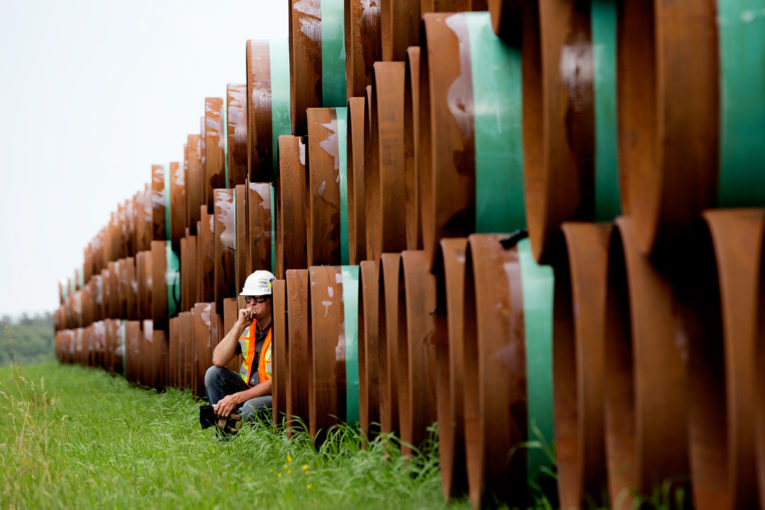
CALGARY – Enbridge Inc.’s costs to build its Line 3 replacement project through Minnesota could rise by US$1.2 billion, or 16 per cent, analysts said Thursday, ahead of a critical regulatory decision in Minnesota.
The Minnesota Public Utilities Commission is set to rule on the Line 3 pipeline during the two-day-hearings on July 26 and 27.
BMO Capital Markets analyst Ben Pham outlined four possible outcomes from the Minnesota PUC decision: the regulator could either deny the project entirely, approve it entirely, approve the project along an alternate route, or approve the company’s preferred route but also require Enbridge to dig up and replace the old pipe.
That last option is the most likely, Pham predicts, noting that it could add US$1.2 billion in costs to the Line 3 replacement project. Enbridge has earmarked $7.4 billion to build the pipeline.
Pham also reduced his price target on the company as a result to $59 per share on the Toronto Stock Exchange, from $61 per share.
The reduced price target still implies a large premium on the company’s shares, which were trading at $42.72 per share on the TSX mid-day Thursday.
The company did not respond to a request for comment Thursday on whether it anticipated additional costs.
The Line 3 replacement is considered a critical project in the Canadian oilpatch as it would roughly double the capacity of the line to 760,000 barrels of oil per day, boosting deliveries of crude oil to the U.S. Midwest, currently the largest market for Canadian oil.
Line 3 is part of Enbridge’s mainline system that connects oil storage hubs in Edmonton and Hardisty, Alta. with refineries in Wisconsin, Minnesota and other parts of the Midwest.
Enbridge has been forced to apportion space on its pipelines for months, as Canadian oil production outstrips pipeline export capacity and as no new export pipelines have been built to accommodate the rising production.
The most recent crude oil forecasts from the Canadian Association of Petroleum Producers projects oilsands production will rise by 1.55 million bpd between now and 2035, underscoring the need for new pipelines.
Canadian oil producers have had to accept steep discounts for their barrels relative to oil produced in the U.S. due to the lack of capacity. According to GMP FirstEnergy data, the differential between Western Canada Select and West Texas Intermediate oil prices rose to $24.35 on Wednesday.
Given the stakes, the Minnesota PUC’s decision will be closely watched in Calgary’s oilpatch.
Canaccord Genuity analyst David Galison said in a note Thursday that the most likely outcome from the state regulators is an approval of the project adding that “a positive approval is needed to help with current egress bottlenecks for Canadian crude.”
A negative decision on the project is the least likely outcome, and deal a blow to Enbridge and Canadian oil producers, he said.
“A rejection of the (Line 3 replacement) would be very negative for both Enbridge as well as Canadian heavy oil differentials,” Galison said. He noted that the project, when the U.S./Canadian dollar exchange rate is factored in, is expected to cost $9.08 billion, which represents 40 per cent of Enbridge’s $22 billion growth program.
Galison expects the Line 3 replacement would generate over $1 billion in earnings before interest, taxes and depreciation for Enbridge.
“Removing this much earnings contribution could jeopardize the company’s dividend growth outlook as well as impact the company’s accelerated deleveraging process,” Galison said.
• Email:
You can read more of the news on source
